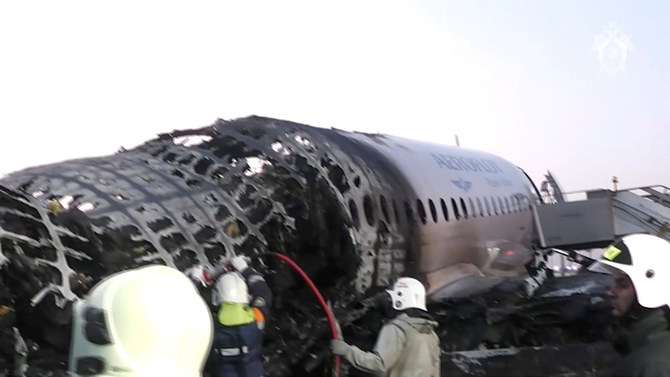MOSCOW: The pilot of a Russian passenger plane that erupted in a ball of fire on the runway of Moscow’s busiest airport, killing 41 people, said lightning led to the emergency landing.
Investigators were on Monday working to understand the causes of the blaze after the Sukhoi Superjet-100 had to return to Sheremetyevo airport shortly after take-off Sunday evening.
Pilot Denis Yevdokimov told Russian media the aircraft lost communication and needed to switch to emergency control mode “because of lightning” on the Aeroflot flight to the Arctic city of Murmansk.
He did not specify if the plane was struck directly.
“We managed to restore communication through the emergency frequency on our radio connection. But the link was only for a short time and kept cutting out... it was possible to say only a few words,” he told the Komsomolskaya Pravda newspaper.
Videos on social media showed the plane crash-landing and then speeding along the runway with flames pouring from its fuselage.
People could be seen leaping onto an inflatable slide at the front and running from the blazing plane as columns of black smoke billowed into the sky.
Another video shot inside the cabin showed roaring flames outside the window and passengers crying out in panic.
Yevdokimov said he believed the plane burst into flames on landing, most likely because of full fuel tanks.
Aside from the dead, nine people were in hospital, three of them seriously injured, authorities said.
US Secretary of State Mike Pompeo said an American citizen had died as he expressed “sincere condolences” to the families of the victims.
Russian President Vladimir Putin offered his condolences to the victims’ loved ones and said the investigation into the disaster “should be as thorough as possible.”
The jet — carrying 73 passengers and five crew members — took off from Sheremetyevo at 6:02pm (1502 GMT) and the crew issued a distress signal shortly afterwards, officials said.
Flight tracking site Flightradar24 showed the plane circling near the capital before landing.
Transport Minister Yevgeny Dietrich said there were no plans to ground the Superjet-100 model.
The charred aircraft surrounded by vehicles and a crane could still be seen from the terminal on Monday afternoon.
The Russian Investigative Committee later said the fragments were moved into a hangar and black boxes handed to experts.
Flight schedules at the airport were disrupted by the accident due to one of the two runways being closed.
Several people on board said they witnessed the lightning strike.
Passenger Pyotr Yegorov told media: “We had just taken off when the plane was hit by lightning... the landing was very hard, we almost passed out from fear.
“The plane bounced on the tarmac like a grasshopper and burst into flames on the ground.”
“We had taken off, we were in a cloud, there was heavy hail,” flight attendant Tatyana Kasatkina told the Rossiya 24 news channel.
“Then it was like a slap, a flash, like electricity. It all happened very fast.”
Vladimir Yevmenkov, another passenger, told TV news he saw lightning striking the right engine of the plane twice from his seat after take off.
“There were two very loud bangs and two flashes, but the engine did not catch fire.
Aviation expert and former construction engineer at Sukhoi, Vadim Lukashevich, said a lightning strike is “does not lead to any catastrophic consequences” for modern planes.
The plane ignited when “the chassis pierced the fuel tank” during a hard blow against the runway, causing a “heavy leak,” he told AFP.
Russia’s national carrier Aeroflot was once notorious for a poor safety record but in recent years its image has improved and it has not had a fatal accident in more than a decade.
The Russian Sukhoi Superjet-100 however has been dogged with problems since its launch in 2011.
In 2012, a Superjet performing at an Indonesian air show slammed into a volcano, killing all 45 people on board. Indonesia blamed the crash on pilot error.
Technical problems with the plane have been reported in recent years and Russia has struggled to convince foreign carriers to purchase it.
The government offered subsidies to encourage Russian airlines to buy the Superjet and Aeroflot has became its main operator.
In 2018, it announced a record order of 100 Superjet-100s.
Russian regional airline Yamal said Monday it had canceled an order for 10 of the jets but said this was to do with servicing costs rather than the crash.
The Murmansk region — where many of those killed or injured are believed to be from — went into a three-day period of mourning from Monday.

























